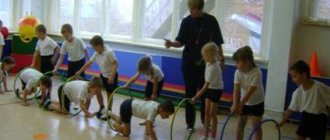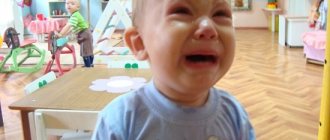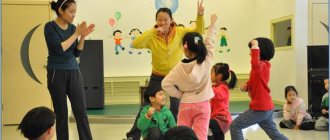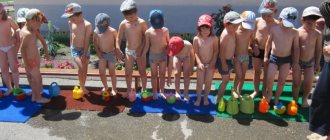Many parents often wonder at what age to send their child to kindergarten, what groups are there in public kindergartens and what is the fundamental difference between them.
Depending on the age, the child will fall into one group or another. There are 5 age groups in public kindergartens.
- A short-term stay group is open for children 1-3 years old;
- children from 3 to 4 years old fall into the younger age group;
- The middle group includes children 4-5 years old;
- the senior group is attended by children aged five and six;
- and boys and girls aged 6 and 7 years old go to the preparatory group.
Short stay group (STG)
As a rule, very young children from 1 to 3 years old are enrolled in the short-stay group. This service can be used by any interested parent who has submitted the necessary documents and joined the queue. Such groups work 3 times a week for 3 hours in total.
Classes there start at 8:30 and last until 11:30. There is also an evening shift from 16:00 to 19:00. It all depends on the schedule of classes at the educational institution, so always check the opening hours at your garden.
Note to parents
Most often, parents worry about at what age to send their child to kindergarten and whether it is worth doing it so early, because children from 1 to 3 years old still need their mother’s presence. It is especially difficult for parents to make a decision if this is the first baby in the family.
Staying in kindergarten is the very first and most important experience for every child. Here he learns to show his personal qualities and communicate with peers.
If we omit the details, the opinion of many experts agree on one thing: from a psychological point of view, meeting and communicating with children in a playful and relaxed manner helps the child adapt and enter society. After all, in this society the child will grow and develop, gain experience and experience different stages of personality development. And the sooner the child begins to adapt, the better it will be for his psychological health.
It should be noted that young mothers and fathers should also be prepared for such a responsible step.
And before you send your child to a short-stay group, make sure that this is exactly the place where your son or daughter will be comfortable.
Today you can quickly find reviews on the Internet about any product or service. Look for reviews and comments about your kindergarten. And you probably know mothers whose children also go to this kindergarten. You can also come to the kindergarten and see everything with your own eyes, and chat with the nannies and teachers.
What activities are conducted with children in short-stay groups?
Typically, such groups have 2 classes a week of physical education and music and once a week classes in drawing, modeling, literature and design.
It’s also not difficult to sign up for GKP groups. They are available in almost all preschool institutions. To be included in the group, you must:
- contact the head of the kindergarten with a request to enroll the child in the GKP. If there are places in the group, you will definitely be accepted;
- if there are no free places, contact the so-called “Mini-OSIP” (this is the district information support service).
- You can also sign up for the group through the city services portal
When you have found a place, you need to worry about documents for the garden. There are not many of them, but you will have to collect them quickly:
- passport of the parent or legal representative of the child;
- baby's birth certificate;
- child registration in the city;
- if you have benefits, also provide a document for inclusion in the preferential category;
Enrollment in the GKP occurs in the same way as in a regular kindergarten group. You are put on a waiting list and when a place becomes available, they call you and inform you that your child can go to kindergarten.
Procedure for enrollment in a short-stay group.
When there are few free places in a group, the head of the kindergarten must follow certain rules when enrolling a child in the group. For example, your child will be accepted faster if:
- your family (or child) lives/is registered in this area;
- preferential categories of children
If all children from this list are enrolled, then in order of priority the following are enrolled:
- children with temporary registration
- kids from other areas
A parent does not have to go to the daycare every week or month to find out if a place has become available. Typically, parents are sent an email notification or receive a call on their cell phone.
When enrolling in kindergarten, check the availability of a medical card, and immediately before enrollment you must provide:
- contacts of the child and his parents;
- complete blood count and urine test;
- analysis for enterobiasis and worm eggs
Before enrolling a child in a kindergarten group, the parent will have to sign a service agreement, which will spell out all the rights and responsibilities of both parents and teachers.
As a rule, documents of this kind protect both parties from possible claims. Therefore, every parent should not be lazy and read this agreement carefully.
Features of children staying in a short-term group
The child is not in kindergarten all day, but only for some part of the day, so meals are not provided here. But any baby can freely ask for water. So before you send your son or daughter to kindergarten, don't forget to feed him.
Adaptation in the group is quite smooth. Any parent can go to the group and see how their child feels there. This makes it easier for the baby to survive a long separation from his parents and get comfortable in a new environment. Remember also that the child’s psyche is quite vulnerable at this age, and any innovation can have a bad effect on his emotional state. But if you prepare your baby and send him to a short-term group, you can avoid negative emotions on the part of the baby.
The first days in the GKP last only half an hour for a child. Then the stay time becomes longer, but it all depends on the child’s behavior and addiction. Often educators recommend starting with half an hour and adding only 15 minutes every few days so as not to escalate the situation.
Approximate schedule for short-stay groups:
- Monday - 9:00-9:10 music games; 10:10-10:20 didactic games;
- Tuesday—10:00-10:10 movement development, 10:30-10:40—artistic creativity (drawing, modeling, appliqué, coloring must alternate here);
- Wednesday—9:00-9:10 didactic game, 10:00-10:10 speech development;
- Thursday—9:00-9:10 outdoor game; 10:00-10:10 games with building materials;
- Friday—9:10-9:20 educational game; 10:00-10:10 music game
The average monthly cost of GKP is about 1,500 rubles. However, if you have benefits, you can write an application for payment compensation (or part of the compensation).
What additional expenses does the parent expect?
Many kindergartens and groups also have additional expenses, which most often depend on the director of the kindergarten. This point should also be discussed in advance, and it is best to do this at the time of signing the contract with the garden. Although, the times when huge gatherings were held in gardens are long gone.
However, some parents face actual extortion. In this case, you should contact the anti-corruption hotline.
How to behave as an adult?
Both the teacher and the parent can contribute to a favorable adaptation to the nursery. Appropriate help and support can alleviate the psycho-emotional state of the child.
The main task of the parent is to prepare the baby in advance for visiting the nursery.
You cannot place a child in an unfamiliar environment just like that, without prior preparation.
- It is advisable to start the stay in a preschool institution with several hours and subsequently increase this time gradually.
- Parents are advised to teach their child all the rules of personal hygiene at home. This will make it easier for him to get used to the teacher’s requirements.
- It is advisable to develop a certain diet, give up snacks, and also instill skills in using cutlery. It is important to explain to the child that he needs to eat the whole portion - otherwise he simply will not have enough energy, and he will not be able to explain the physical discomfort he experiences.
- Daytime naps are an integral part of preparing to attend kindergarten, and you will also have to get used to this. Children sleep in nurseries because their leisure time is dynamic, rich, and varied. If a child refuses to nap at home during the day, you should take a more responsible approach to organizing your free time.
- Clothes and shoes should be comfortable and practical. The baby should not be afraid to get it dirty or wrinkled. Movements should not be constrained, and if necessary, the child should be able to take care of himself independently - it is advisable to abandon complex lacing, fasteners, and fastenings.
- You should be allowed to take with you to the nursery only those toys that he is ready to share and that he does not mind spoiling or losing.
We must not forget that deception, even due to a sharp change in circumstances, can become a very difficult truth for a child, shake his trust in his parent and negate all efforts to successfully adapt to the kindergarten.
The teacher also plays an important role in the child’s adaptation process. The quality of interaction with the baby and with the parents affects how the whole process will go overall and how quickly it will end.
In order for the adaptation to be painless, the teacher, first of all, needs to establish contact with the parents and agree that they bring the children at intervals of 10 minutes. This will allow you to meet each child and find a common language with him, making the process of parting with the parent easier.
It is important to establish trusting relationships with children so that they feel safe:
- show affection, kindness, interest;
- offer help;
- smile more often;
- tactile contact;
- involvement in group games;
- inquire about your mood and well-being.
The interior of the room should be cozy - decorative items, corners for privacy, a clean, soft carpet, a variety of toys.
Junior groups for children 3-4 years old
Junior groups are open 5 days a week (Monday-Friday) from 7 am to 19:00 pm. Children aged 3 and 4 years old are enrolled in this group.
At this age, every child goes through a period of personality formation, habits and character traits are formed.
In the younger group, children get acquainted with the outside world, make new acquaintances and learn new skills. Sometimes children learn many times more in kindergarten, communicating with peers, than sitting at home with their mother.
Teachers conduct many developmental activities. This has become especially true nowadays. So children, visiting the younger group:
- recognize the world around them;
- learn correct speech;
- read fiction (in particular fairy tales and short stories);
- learn letters and numbers, get acquainted with counting;
- engaged in modeling and design;
- learn the basics of drawing and appliqué
Features of the younger group:
- at 3-4 years old, the child is already actively developing and this development is radically different from what it was in the nursery. Up to 3 years of age, children need close attention and affection, and after 3 years of age, children develop curiosity about the world around them;
- At the age of 3, children begin to show interest in group games. The child begins to become more actively acquainted with peers and communicate in society. Teachers can only help and encourage children to communicate. This is how the first independence appears.
- Many teachers and psychologists are sure that the development of children at 3 and 4 years old is the most crucial period. Let us note that it is at this age that children often suffer from colds and viral diseases when they come into contact with each other. Here you will have to be patient, because the baby’s young body is faced with many types of bacteria and viruses. But it’s a completely different matter when nannies and kindergarten teachers are negligent and the kids get sick.
- For the first time, children show their intellectual development in society. It should be noted that it is different for each baby. Some people understand faster what teachers are talking about, while others are a little slower. Here everything is in the hands of the teachers, because they must find an individual approach to each child. If you come across just such nannies and teachers, rest assured - you have chosen the right kindergarten.
- Most often, in the younger group, children acquire self-service skills: they learn to dress and undress themselves, go to the toilet and wash themselves, and even try to eat on their own;
What children learn in the younger group of kindergarten
- at this age, the child learns to dress and undress, put on and take off his shoes;
- hold cutlery and eat independently;
- they understand that they need to finish the soup and then start the second course;
- ask to use the potty, go to the toilet independently and wash their hands before and after using the toilet and playing.
Basic educational skills in the junior group:
- The child knows how to navigate around. He understands that left and right are different directions, and clothes have a front side and a back side;
- the child is oriented in the concepts of space and time. For example, a child will understand if you say: under the bed, in front of him, near the table, and so on.
- distinguishes geometric shapes: circle, square, triangle and rectangle;
- distinguishes colors;
- a child can use a model (looking at an adult) to build a pyramid from cubes of the same color, arrange objects by color;
- at this age, children strive to help adults: bring plates to the table, water or sprinkle flowers, carry a bag, etc.;
What classes are taught to children of the younger group in kindergartens?
Whatever activity the teacher conducts, it should be done in a playful way. Under no circumstances should you force your child to play or do anything. All this is necessary in order to develop a child’s interest in activities. This is how the baby develops independence and the desire to do everything as best as possible.
Features of classes in junior groups:
- At this age, the child does not yet know how to maintain concentration for a long time, therefore, classes should last no more than 15 minutes. Otherwise, you will lose the child’s attention and the baby will simply lose interest;
- At 3 years of age, the focus is on fine motor skills and motor coordination. It will be great if you allow your baby to tie his own shoelaces and fasten the buttons on his clothes;
- Children's oral speech is actively developing. Teachers read fairy tales and stories that set the child up to learn and memorize new words and phrases. It is also important to show pictures to the baby and give him the opportunity to repeat all the recently learned words;
- the child also develops his aesthetic skills through modeling and drawing;
- at the same age, physical exercises are introduced to develop flexibility, agility, endurance and speed in children;
- There is also music education, where children learn to distinguish sounds by pitch and intensity, and also become familiar with musical rhythm;
- At this time, costume performances begin to take place in the garden.
How is the period going?
Adaptation of children to nurseries goes through several periods, characterized by the severity of certain negative reactions.
Acute phase .
At the first stage, maximum mobilization of the child’s body is observed. The baby is constantly in an excited, tense state. He is whiny, nervous, capricious, hysterical both within the walls of a preschool educational institution and at home.In addition, physiological changes related to heart rate or blood pressure can be observed. At this stage, susceptibility to all kinds of infections and viruses increases.
- Moderately acute phase . The severity of negative manifestations noticeably decreases, the baby gradually adapts to the changed living conditions. There is a decrease in excitability, nervousness, improved appetite and sleep. However, at any stage of this phase, a resumption of negative emotions is likely - hysterics, tearfulness, reluctance to part with parents.
- Compensated phase . Characterized by stabilization of the mental state. The child successfully finds ways to interact with the teacher and peers and actively begins to learn new skills.
Adaptation cannot be avoided - it is the body’s natural reaction to changed conditions. Some children successfully cope with stress in a few weeks, while others remain in emotional stress for several months.
Middle groups in kindergarten
The middle groups accept children 4-5 years old. Parents can bring their children daily from Monday to Friday from 7:00 am to 7:00 pm.
By the age of 4-5, a child is already developing as a personality. Kids know how to evaluate themselves and other children. The guys try to keep up with their peers. In addition, children can already notice individual character traits.
You can easily notice how your child tries to copy your actions. And if he has any difficulties, he tries to solve the problem on his own. The child still actively communicates with other children in the group (or even in kindergarten), actively shares his skills and gains new knowledge from his peers. All this helps the comprehensive development of the child and expands the baby’s horizons.
By the age of 4-5, the child is already practically formed. At the same time, you may notice that each child is individual: each has his own character, interests, tastes and preferences. Children at this age are quite active and mobile, they regularly make new acquaintances. Sometimes parents begin to worry when they see their son or daughter being excessively active. There is no need to worry, much less limit the child’s activity. In this case, the parent can only help the baby develop correctly, creating comfortable conditions for growing up. For example, a child must be enrolled in a kindergarten, where he fulfills all his needs by communicating with peers and teachers. And at home the child will behave calmer and more relaxed.
What main classes should be included in the middle group of kindergarten?
- getting to know the world around us (what objects surround us, what is happening around us, what “friendship” and “family” are)
- elementary mathematical processes (children learn to count from one to 10, and also learn addition and subtraction);
- speech development (children learn to retell short tales and stories, enrich their vocabulary, learn to speak correctly);
- get acquainted with literary works and authors of favorite fairy tales and stories;
- attend lessons in modeling, drawing, and design (thanks to this, the baby develops imaginative and spatial thinking);
- music lessons (children continue to become familiar with pieces of music, rhythm and tempo);
- engage in physical exercise (just 10-20 minutes of exercise will help the child develop endurance and speed). In general, at this age, sports are extremely useful for children. You can enroll your son or daughter in gymnastics or dance classes. Typically, children are happy to engage in their chosen activities and communicate with a new team. It is not so important here whether your child is the best. Here the process of training itself is beneficial. Your child will grow up healthy and confident, he will be able to achieve any goal and learn to solve any problems on his own;
What is the psychological atmosphere in the middle group?
Every parent should understand that all of the above activities should be carried out in a friendly manner. The child himself must want to do what the kindergarten program offers. Teachers should pay special attention to relationships in the children's team. It is extremely important here that children feel psychologically comfortable and cozy - this is the main condition for staying in kindergarten.
If you notice any problems in the team or any psychological pressure on the child from teachers or peers, you should think about changing kindergarten.
Today many gardens are open, both private and public. And if you are worried at any point, do not waste time, because the psychological health of your son or daughter should come first.
Mistakes of parents and educators
The main mistake parents make when moving to a preschool is trying to influence the child without paying attention to the obvious demonstration of negative reactions.
Many children are literally brought to the kindergarten by force - in tears and hysterics. For a child, such circumstances become psychologically traumatic.
Most parents are seriously busy with work, but this is not a reason to show disinterest, not communicate with the child on the way home, or not ask about the day spent in the garden.
Kids want and need:
- share emotions;
- experience;
- receive approval from others.
The teacher must find an individual approach to each child, because subsequently the teacher becomes a second mother for the children, a significant adult to whom they can always turn for help.
If a child is aloof and uninitiative all day, it is important to give him special attention. The fundamentally important task of any teacher is to tirelessly monitor the behavior, mood, and well-being of each child.
A negligent attitude towards their physical or mental health can provoke the development of serious disorders.
Senior group in kindergartens
State kindergartens and senior groups are open every day from Monday to Friday from 7:00 am to 7:00 pm. Children 5-6 years old attend the older group.
Usually the senior group includes those children who have already graduated from the junior and middle groups. It turns out that they can already do and know a lot, but continue to develop their skills in the older group.
As a rule, classes last no more than 25 minutes and end with “physical education minutes” so that children can switch their attention, relax and get distracted.
What classes are held in the senior group?
- acquaintance with the outside world continues (children already know a lot at this age and are able to communicate on any topic: about family, about nature, share impressions about a cartoon they watched or a story they read)
- speech development (at this age, children absolutely understand what adults want from them, they can independently express their thoughts, draw conclusions and even argue)
- acquaintance with literature (here children learn to analyze and discuss not only children's works, but also discuss fairy tales with subtext, epics and recognize the main idea of the work);
- math classes (at this age, children learn the principles of addition and subtraction, and also try to come up with problems on their own and look for solutions);
- appliqué and modeling (besides the fact that children adore such activities, they also develop a sense of beauty, learn to complete any task, express themselves, develop perseverance and accuracy);
- drawing (of course, this type of activity develops a sense of beauty, painting and graphics especially help);
- musical classes help the child develop musical and creative abilities and learn to emotionally perceive any piece of music;
- manual labor and making crafts from improvised means and natural materials. Here all available items are used: cotton wool, sticks, tubes, cones and acorns, fallen leaves, paper and cardboard.
- physical education helps to further develop your baby’s physical abilities.
Note to parents
At the age of 5-6 years, each child already develops basic qualities and character traits:
- intelligence develops. Many parents notice that their child’s views and judgments change. They are now more balanced and logical, and the child wants to regularly explain his words and actions;
- strong-willed qualities appear (the child begins to understand the difference and meaning of words and phrases, such as “I want”, “I can” and “necessary”;
- the child learns to take responsibility for the words spoken and his actions;
- social relationships are formed with friends and the team. The child shows interest in his peers; the child wants to be friends, the first sympathy appears;
- the child forms his own opinion regarding any topic and the child actively seeks to express his personal opinion;
- the child learns to analyze and his memory properties change. At this age, the child can concentrate his attention longer, especially on those subjects that seem interesting and useful to him.
Do we even need a nursery?
Each parent has the right to independently decide when to take their child to kindergarten and whether to do it in principle.
Early adaptation is much more difficult; failure to understand the seriousness of what is happening can lead to all sorts of negative consequences .
On the other hand, early attendance at kindergarten, if all recommendations are strictly followed, will help ease the further transition to school and make the child more independent. In kindergarten, all conditions are created for full, comprehensive development, similar indicators of which are difficult to achieve at home.
Young children naturally cause particular concern among parents, so many of them simply refuse to attend nurseries in order to maintain mental well-being.
If at least one of the parents has the opportunity to pay attention to the child at home - organize useful leisure time, instill self-care skills, engage in training and education, provide conditions for the child to interact with peers, refusal from the nursery may be justified.
In all other cases, visiting kindergarten is a useful, vital experience that every child needs.
Preparatory group in kindergartens
At 6-7 years old, children attend a preparatory group. The working hours of this group are the same as the previous ones: Monday to Friday from 7:00 am to 7:00 pm. This is the final year in kindergarten, and the next year the child already goes to school.
In the preparatory group, children prepare for school, therefore, they study literature, mathematics, reading and drawing. In addition, children become familiar with the rules of the road. Complex classes will be especially useful here.
A distinctive feature of such classes is that different types of activities are combined in one lesson. This helps the child maintain concentration longer, despite the fact that even at 6-7 years old children are quite mobile and active;
Costume theatrical performances with songs and dances are also held here. And the prom symbolizes farewell to kindergarten and the entry into a new stage of growing up.
What do children do in the preparatory group?
At this age, the child already has a daily routine in the kindergarten and children try to stick to it even when they are at home with their parents.
Approximate daily routine in the preparatory group:
- the child comes to kindergarten and changes clothes;
- while the group is gathering, the child is engaged in independent activities;
- morning exercises;
- breakfast;
- games at your own request;
- classes according to the methodological plan;
- outdoor games;
- dinner;
- dream;
- getting up, going to the toilet;
- afternoon snack;
- games at your own request;
- games and walks outside;
- dinner;
- packing home
Such a daily routine helps organize and prepare children for school preparation. At the same time, children socialize and play outside a lot, but also study literature, mathematics and writing. Children are taught what a traffic light is, how to navigate and behave correctly on the street.
Note to parents
Parents often ask the question: at what age should they send their child to school? Some people want to send their child away at 6 years old, while others think that the child should spend another 1 year in kindergarten.
Psychologists say that a child must be physically and mentally prepared to go to first grade.
If you see that your baby is still uncomfortable and unusual in leaving the kindergarten and he is only 6, then it is better to leave him in the preparatory group. If a child goes to school at age 7, he will lose absolutely nothing. In addition, this will help the child avoid psychological stress.
Age characteristics of children in the preparatory group
At 6-7 years old, every child dreams of learning something important and useful. The child rather perceives activities in the kindergarten as a game, where the child tries in every possible way to demonstrate himself and his best qualities and abilities. He especially wants to distinguish himself from others and earn praise.
You should not be silent at this time. Praise your son or daughter even if they are not doing well yet. You show him that you appreciate his efforts and successes. This is how the child develops self-esteem and healthy self-esteem.
The child's intelligence becomes noticeably higher. Ideas about the world also change and become broader.
As you can see, kindergarten plays an important role in raising a child and developing him as a person. But we should not forget that both boys and girls need regular attention and care from both the father and the mother. Both at 2 and 7 years old, tell your child how much you love him, that you are always on his side and what a great guy he is for trying.
Difficulties
Adaptation to new living conditions at an early age is complicated by age-related developmental characteristics . Children have not yet fully developed the mobility of nervous processes - they are less mobile, it is difficult to distract them or interest them in a new toy.
Not all children have time to master the methods of verbal interaction - therefore, they do not always correctly perceive the speech of an adult addressed to them. Kids cannot boast of experience communicating with different people; it can be extremely difficult to calm them down.






